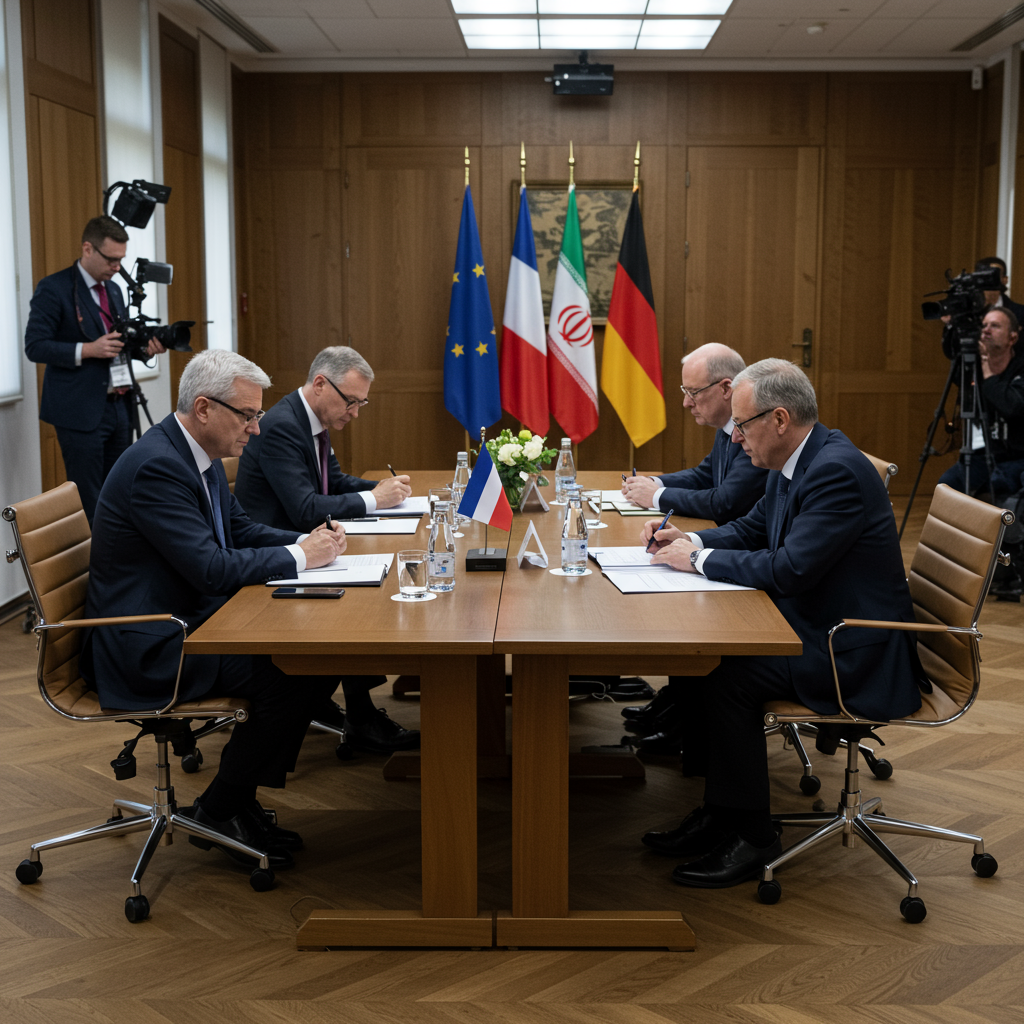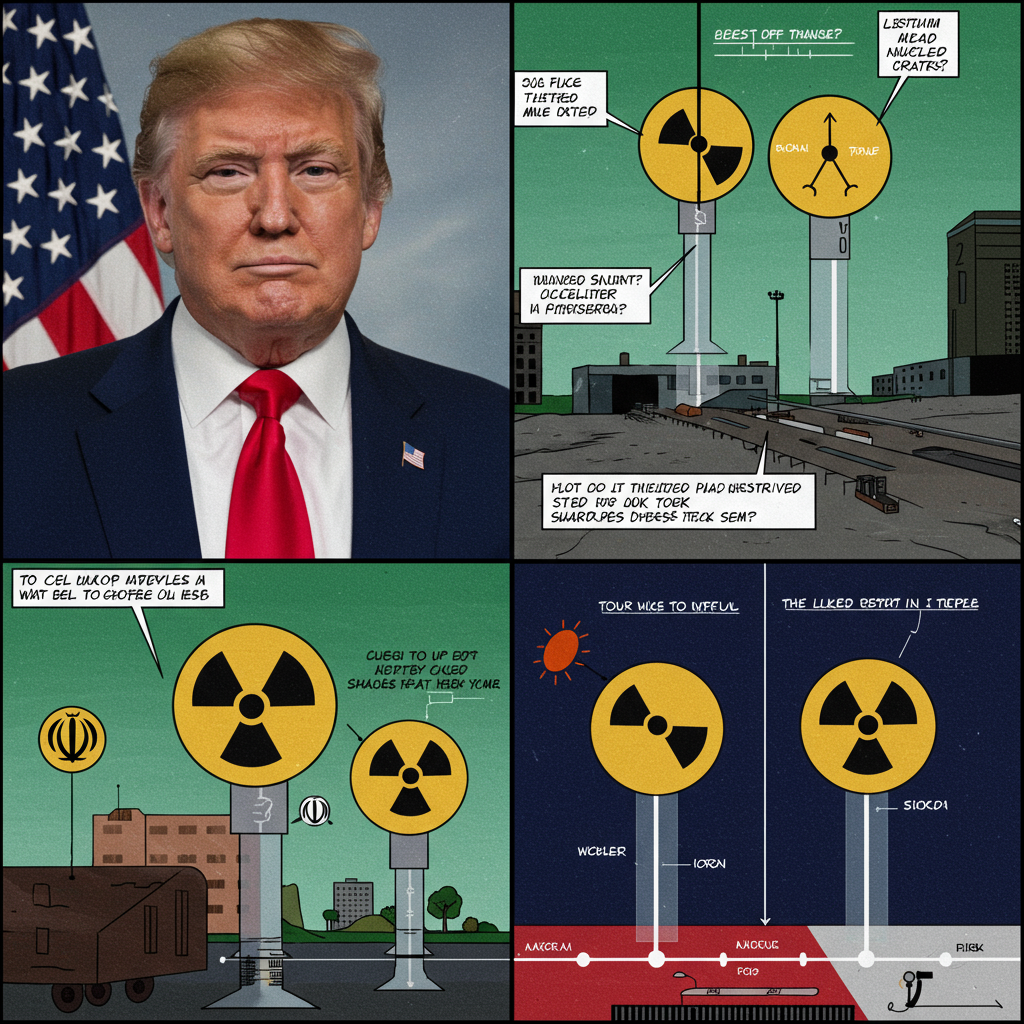Amidst a rapidly escalating direct conflict between Israel and Iran, top European diplomats convened high-stakes talks with Iran’s foreign minister in Geneva. This meeting marks the most significant face-to-face diplomatic engagement between Tehran and Western powers since Israel launched a surprise offensive against Iran one week prior, plunging the region into a perilous new phase of hostility.
The discussions involve the foreign ministers of the United Kingdom, France, and Germany – the trio known as the “E3,” which previously spearheaded negotiations leading to the 2015 nuclear deal. They are joined by the European Union’s foreign policy chief for this critical session with Iranian Foreign Minister Abbas Araghchi.
Seeking a Diplomatic Off-Ramp
The primary objective of the European delegation is to find a diplomatic solution to the spiraling crisis and prevent a wider war, particularly focusing on concerns surrounding Iran’s nuclear program. British Foreign Secretary David Lammy described the situation as “perilous,” stating after meetings with U.S. officials that “a window now exists within the next two weeks to achieve a diplomatic solution.”
This urgent timeframe aligns with President Trump’s announced deadline – relayed by the White House – to decide by early July whether the United States will conduct a military strike against Iran. While the White House has tamped down speculation of immediate U.S. involvement in Israel’s offensive, the potential for American action looms large over the diplomatic efforts.
European officials are pressing Iran to return to substantive nuclear negotiations. They express significant concern that Iran’s nuclear activities, including enriching uranium up to 60%, a level technically close to weapons-grade, have significantly exceeded permissible limits for peaceful use under previous agreements. Germany’s Foreign Minister Johann Wadephul stressed that Berlin is open to discussions if Tehran shows “serious willingness” to provide assurances on its nuclear and missile programs, including renouncing enrichment for weaponization and reducing its missile capabilities. French Foreign Minister Jean-Noël Barrot defended France’s “neutral stance,” emphasizing adherence to international law amidst the conflict.
Iran’s Stance: Dialogue, Not Negotiation (with US)
Iran’s position remains firm while under attack. Foreign Minister Araghchi stated on state television that Iran refuses to “negotiate” with anyone, particularly the United States, while “the Zionist regime’s aggression continues.” He accused the U.S. of complicity, citing recent social media posts by President Trump suggesting U.S. involvement in controlling Iranian airspace. Araghchi indicated Iran is open to “dialogue” – explicitly differentiating it from negotiation – with others, specifically Europeans, but only on “solely on the nuclear issue and regional matters,” firmly excluding its missile program from discussions. Speaking before the U.N. Human Rights Council, he asserted that Israeli strikes on nuclear facilities constitute “grave war crimes” and that Iran is determined to defend its sovereignty.
US and Israeli Perspectives
The United States position is complex. While President Trump weighs potential military options, including a strike on Iran’s heavily fortified Fordo uranium enrichment facility (which experts note would require specialized “bunker buster” bombs but might not eliminate Iran’s future nuclear know-how), the U.S. Secretary of State has indicated the U.S. remains ready for “direct contact with the Iranians at any time.”
Israel remains deeply skeptical of diplomatic talks with Iran. Israel’s Ambassador to the United Nations, Danny Danon, voiced doubt in Geneva, questioning the effectiveness of talks over past decades and stating that only a “genuine effort to dismantle the [nuclear arm] capabilities of Iran” would be considered worthwhile, dismissing the Geneva session as likely another ineffective “session and debates.” Israeli Prime Minister Benjamin Netanyahu has also reportedly indicated that Israel intends to continue attacking Iran’s nuclear sites regardless of whether the U.S. decides to take military action. Anonymous sources suggest Israeli officials believe they can destroy Fordo themselves, though U.S. assistance would expedite the process.
International Appeals and Continued Fighting
Amidst the diplomatic maneuvering and mutual skepticism, calls for restraint are also emanating from the international community. U.N. Secretary-General António Guterres urged the Security Council to act to prevent a wider conflict, warning that the expansion could ignite a “fire that no one can control.” Rafael Grossi, head of the International Atomic Energy Agency (IAEA), told the council he believes a diplomatic solution is achievable and that the IAEA can verify Iran doesn’t develop nuclear weapons through inspections. Independent experts, however, assess that Iran has already enriched enough uranium for multiple bombs.
Despite the diplomatic push in Geneva and international appeals, fighting on the ground and in the air continues. Both Israel and Iran reported trading strikes overnight into Friday, hitting military and strategic targets. Reports indicate heavy casualties on both sides, with varying figures provided by official sources and independent groups like the Human Rights Activists News Agency, which recorded significantly higher fatalities in Iran from Israeli attacks. Civilian areas have also been impacted, including Iranian missiles hitting residential buildings and a hospital in southern Israel.
The talks in Geneva represent a crucial, albeit challenging, effort by European powers to steer the region away from outright war and back towards addressing the core nuclear issues, navigating complex and often conflicting positions from Tehran, Washington, and Jerusalem. The “window” for diplomacy appears narrow, underscored by the ongoing violence and looming U.S. decision deadline.


